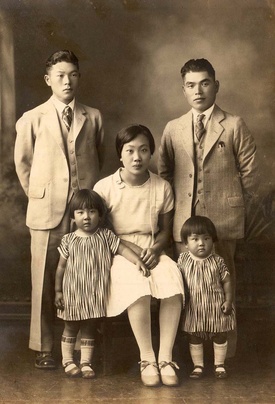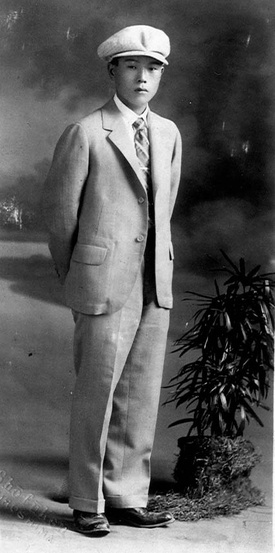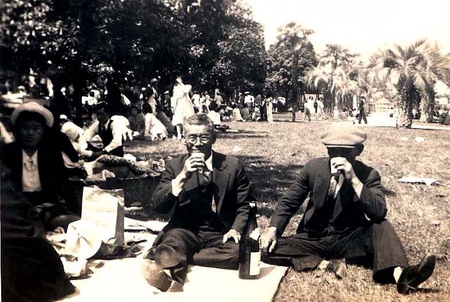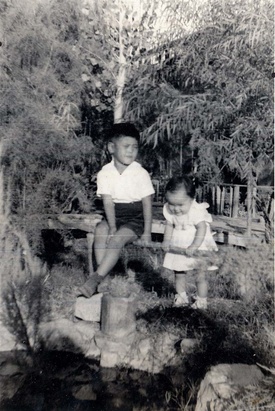I did not really think about the subject until I was guiding a tour at the Japanese American National Museum (JANM) where I volunteered as a docent for many years, giving well-regarded tours. Unfortunately, in one of my tours, I innocently made a comment to a visitor in regards to “being Japanese” that was misinterpreted. I realize in hindsight that I should have taken the time to explain the background of being Japanese and in retrospect, it has led me to write on the question: Am I Japanese?
Whether I am Japanese or not, may be decided by how I view myself and how other people look at me. My Japanese ancestry traces back to the end of the Edo era of Japan (1860). It surely goes further back, but there is sparse written history for non-samurai classes of Japan. Am I Japanese?
My father was born in Garden Grove, California, which makes him a second generation Japanese American. At the age of five, he went with his family to Japan (his first generation Japanese parents were raised in Otake, Hiroshima Prefecture.) He graduated from Sanyo High School, in the city of Hiroshima and was expected by his financially middle class family to live as a Japanese in Japan, but Sanyo High School is a school designed for foreign students to be lifted to the high level of a Japanese education.
For graduates to work in the government or for a big business, the alumni and all Japanese had to pass a very difficult test in order to be accepted for employment. Very few native Japanese and even fewer foreign born were able to pass the test. My father was not among the few that passed the test.

He felt that there was limited opportunity in Japan for him and that Japanese society thought of him as a low-class Japanese. So despite his family urging him to stay in Japan, he returned to America to be integrated into American society. He graduated from Huntington Beach High School and was a letterman on the tennis team. He was later a manager of a chili dryer coop complex. Was he Japanese?
During WWII, our family was required by the U.S. military to be evacuated from Huntington Beach, California and were sent to the Colorado River Relocation Center (Poston), an American concentration camp. My parents were U.S. citizens because they both born in Southern California, even though they were of Japanese ancestry. In Poston, we were Japanese enemies, imprisoned for 3.5 years, first by the Office of Indian Affairs and then by the War Relocation Authority. Are we Japanese?
After we were released from Poston and resettled in what is now Fountain Valley, California, we regularly attended the Hiroshima Kenjinkai picnics, playing organized games. The kenjinkai (prefectural association) provides aid, fellowship, and a sense of community for Japanese immigrants from particular prefectures in Japan.
After leaving Poston, I could speak a five-year- old’s level of Japanese, because my grandmother, who took care of the children, only spoke Japanese. As I grew older, my parents, who spoke fluent Japanese, refused to speak Japanese so that their children would not have an accent. As a result, I lost my ability to speak Japanese. But I had to speak fluent Japanese to participate in the kenjinkai, so I was excluded from the kenjinkai meetings. Am I Japanese?
I traveled to Japan to visit my grandmother on her 90th birthday. I was lucky enough to have an English-speaking aunt during the visit. My grandmother cooked a wonderful meal for my wife and me, which was quite an honor because usually she would only cook for my father. She was quite happy and proud of me for being educated and a successful engineer, although she was sorry that, in her opinion, I could not be Japanese. Was I not Japanese?
Am I not Japanese? To answer the question, one must realize that we have different identities in different situations. When we are at the election polls, we are Americans with no hyphen. In my 26-year career at the Jet Propulsion Laboratory (JPL), we worked as a team, composed of JPLers, members of other NASA centers, state and private universities, foreign scientists and their organizations. The team members were of many nationalities and genders. We were team members — some with more prestige and power, but with no hyphens.
Among our family, we are not hyphenated, even if some are white, some are Japanese citizens, Americans of Japanese descent, or have mixed blood lines, or if we are gay or straight. We are a family.
To some of my bicycling friends, I am a Japanese American because of our conversations about my upbringing, my history, and my career.
The question, “Am I Japanese?” is more than a question about my bloodline or my love of the Japanese culture. The answer is, you are what you believe you are, and you must understand that to others, you may or may not be Japanese.
© 2022 Roy Kakuda





